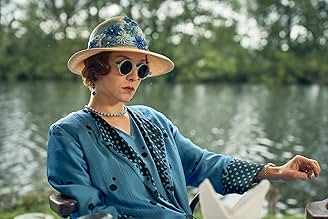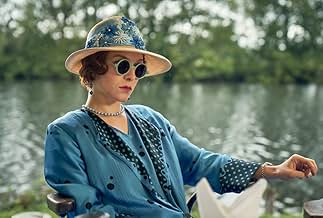AVALIAÇÃO DA IMDb
6,1/10
5,7 mil
SUA AVALIAÇÃO
Uma criada que vive em Inglaterra após a Primeira Guerra Mundial planeia encontrar-se secretamente com o homem que ama antes de ele partir para casar com outra mulher.Uma criada que vive em Inglaterra após a Primeira Guerra Mundial planeia encontrar-se secretamente com o homem que ama antes de ele partir para casar com outra mulher.Uma criada que vive em Inglaterra após a Primeira Guerra Mundial planeia encontrar-se secretamente com o homem que ama antes de ele partir para casar com outra mulher.
- Prêmios
- 2 indicações no total
Nathan Chester Reeve
- Dick
- (as Nathan Reeve)
Sope Dirisu
- Donald
- (as Sope Dìrísù)
- Direção
- Roteiristas
- Elenco e equipe completos
- Produção, bilheteria e muito mais no IMDbPro
Avaliações em destaque
Eva Husson's first English-language film, 'Mothering Sunday,' is a lusty, deeply melancholy portrayal of loss and its lasting impact that often feels disjointed and uneven. It's pretty to look at with impressive performances (and sizzling chemisty) from Odessa Young and Josh O'Connor but, unfortunately, doesn't offer much else.
It is soon after the First World War and three middle-aged couples gather for lunch on Mothers' Day to celebrate the engagement of Paul (Josh O'Connor), the only survivor of the couples' five sons, the rest of whom were killed during the war. But Paul is late to the lunch, because he is having a last tryst with Jane (Odessa Young), a maid employed by one of the couples, the Nivens (Colin Firth and Olivia Coleman). Running parallel to that story is one set some years later, when Jane is a published author and living with fellow writer Donald (Sope Dirisu), who is gentle and wise in the way sole black characters in this sort of production often are. And running parallel to *that* is a story set many *decades* later, in which Jane has grown into Glenda Jackson and reminisces about her two lovers.
Stories revolving around romantic relationships between the British rich 'upstairs' and their subordinates 'downstairs' are ten a penny - although Jane has more common sense than the usual waif and there was not quite as much nudity in the likes of 'Downton Abbey' as there is here! Many of the characters are two-dimensional - Firth does his uncomfortable upper-class schtick yet again and Coleman also seems to be 'phoning in her performance, at least until an emotional outburst makes the viewer realise there is, after all, some life to Mrs Niven. The constant back-and-forth between the various time periods could have been confusing but director Eva Husson manages to give each one a distinctive tone.
On the whole, an enjoyable film that manages to be comforting because of its predictability.
Stories revolving around romantic relationships between the British rich 'upstairs' and their subordinates 'downstairs' are ten a penny - although Jane has more common sense than the usual waif and there was not quite as much nudity in the likes of 'Downton Abbey' as there is here! Many of the characters are two-dimensional - Firth does his uncomfortable upper-class schtick yet again and Coleman also seems to be 'phoning in her performance, at least until an emotional outburst makes the viewer realise there is, after all, some life to Mrs Niven. The constant back-and-forth between the various time periods could have been confusing but director Eva Husson manages to give each one a distinctive tone.
On the whole, an enjoyable film that manages to be comforting because of its predictability.
I wanted to like this film but it strikes me as an empty book, an idea abut time but with no place to go.
Main story set in 1924 sees the country gentry still reeling from the slaughter of World War I Several families maintain the tradition of a picnic by the river on Mother's Day and recall the times when the children played and swam in the river. They're all dead now except for the youngest (Josh O'Connor), who's about to marry one of the daughters who was engaged to one of the boys now dead.
A maid in the house named Jane (Odessa Young), an orphan who's been "in service" since she was 14, is having a secret affair with the boy and meets with him one last time before he goes to the party to announce his engagement to the young woman.
The lady of the house (Olivia Colman) tells the maid she's lucky to have been an orphan. She can observe life without having to deal with the deaths of loved ones.
Jane eventually leaves the house and goes to work in a bookstore where she meets a philosopher and becomes his lover (there's talk of marriage). We also see Jane as an old woman (Glenda Jackson) who has indeed lived most of her life as an observer and as a famous writer.
Jane's life after she leaves the country house is sketchy and the viewer will likely feel cheated. We're not told very much ... yet the film runs for 104 minutes.
Jane strikes me as a character out of time and place. Would an uneducated house maid in 1924 be this self- possessed and confidant? Were interracial marriages possible in England in the 1930s and 40s? What kinds of books did Jane write? No details.
Young is good and O'Connor is better. Colman and Jackson combined have about 10 minutes of screen time. Colin Firth plays the "lord of the manor," but no one else registers.
There's a reference to Virginia Woolf's "Orando" and I guess that's meant to be a clue. Jane is a character out of time. Time is fluid and has no temporal barriers.
Main story set in 1924 sees the country gentry still reeling from the slaughter of World War I Several families maintain the tradition of a picnic by the river on Mother's Day and recall the times when the children played and swam in the river. They're all dead now except for the youngest (Josh O'Connor), who's about to marry one of the daughters who was engaged to one of the boys now dead.
A maid in the house named Jane (Odessa Young), an orphan who's been "in service" since she was 14, is having a secret affair with the boy and meets with him one last time before he goes to the party to announce his engagement to the young woman.
The lady of the house (Olivia Colman) tells the maid she's lucky to have been an orphan. She can observe life without having to deal with the deaths of loved ones.
Jane eventually leaves the house and goes to work in a bookstore where she meets a philosopher and becomes his lover (there's talk of marriage). We also see Jane as an old woman (Glenda Jackson) who has indeed lived most of her life as an observer and as a famous writer.
Jane's life after she leaves the country house is sketchy and the viewer will likely feel cheated. We're not told very much ... yet the film runs for 104 minutes.
Jane strikes me as a character out of time and place. Would an uneducated house maid in 1924 be this self- possessed and confidant? Were interracial marriages possible in England in the 1930s and 40s? What kinds of books did Jane write? No details.
Young is good and O'Connor is better. Colman and Jackson combined have about 10 minutes of screen time. Colin Firth plays the "lord of the manor," but no one else registers.
There's a reference to Virginia Woolf's "Orando" and I guess that's meant to be a clue. Jane is a character out of time. Time is fluid and has no temporal barriers.
So this film is simply gorgeous.
It has a period feel but isn't stuffy. There are as many scenes without clothes as with them - and the actors are beautifully unselfconscious and believable.
The Nivens: an unfathomably brittle, broken and grieving mother (Olivia Coleman) and gentle, empty and lost father and husband (Colin Firth) are exquisitely cast and played - Firth visibly flinches in pain and empathy as Cole snaps at his continued efforts at politeness and generosity to friends. Their lack of sons is palpable in Firth's playing or Mr Niven's gentle paternal encouragement of all the young people they share their lives with (the maid and narrator included) and Cole's sharp silence.
The character of the narrator binds the temporal shifts together as we see how the events of one day can impact a whole life. Amazing acting from Odessa Young makes this film a joy to watch.
The only complaint is the slightly obvious addition of the narrator as an old woman (Glenda Jackson) - this trope is, no doubt, in the source material but could have been omitted as it only serves to make the structure a little cliched.
Otherwise a wonderful and sumptuous - and incredibly well acted - film which is well worth watching over and over again .
It has a period feel but isn't stuffy. There are as many scenes without clothes as with them - and the actors are beautifully unselfconscious and believable.
The Nivens: an unfathomably brittle, broken and grieving mother (Olivia Coleman) and gentle, empty and lost father and husband (Colin Firth) are exquisitely cast and played - Firth visibly flinches in pain and empathy as Cole snaps at his continued efforts at politeness and generosity to friends. Their lack of sons is palpable in Firth's playing or Mr Niven's gentle paternal encouragement of all the young people they share their lives with (the maid and narrator included) and Cole's sharp silence.
The character of the narrator binds the temporal shifts together as we see how the events of one day can impact a whole life. Amazing acting from Odessa Young makes this film a joy to watch.
The only complaint is the slightly obvious addition of the narrator as an old woman (Glenda Jackson) - this trope is, no doubt, in the source material but could have been omitted as it only serves to make the structure a little cliched.
Otherwise a wonderful and sumptuous - and incredibly well acted - film which is well worth watching over and over again .
Greetings again from the darkness. Every writer has a story about what inspired them to put words on the page. What we have here is Eva Husson directing a script from Alice Birch (LADY MACBETH, 2016) who has adapted the 2016 novella from British author Graham Swift. We follow Jane Fairchild through three stages, as her work as a maidservant allows her to become "an occupational observer of life."
It's Mothers' Day 1924 and Jane (Odessa Young, SHIRLEY, 2020) is anticipating her latest romantic tryst with Paul Sheringham (Josh O'Connor, EMMA., 2020). Both know this is their final time together, and they take full advantage. Jane's employers, Godfrey and Clarrie Niven, are meeting Paul's parents for a celebratory luncheon with Emma (Emma D'Arcy), the 'proper' woman Paul is to marry. Oscar winner Colin Firth (THE KING'S SPEECH, 2010) and Oscar winner Oliva Colman (THE FAVOURITE, 2018) play the Nivens, and deaths from WWI hang over all of these families like the darkest of clouds.
The story is told in non-linear fashion, with Jane and Paul's final lovemaking session being that which all other events seem to revolve. We also spend some time with Jane in her 40's as she is living with her philosopher husband Donald (Sope Dirisu), and then in her 80's as she is celebrated as a renowned and prize-winning author. In this last stage, Jane is surprisingly played by the great Glenda Jackson, a two-time Oscar winner (A TOUCH OF CLASS, 1973, and WOMEN IN LOVE, 1969), who has only appeared in a handful of TV movies these past thirty years. Ms. Jackson turns 86 next month, and spent time as an elected member of Parliament. She's always been an interesting person, and it's terrific to see her back on the big screen - even if she only gets a couple of brief scenes followed by one substantial one near the end.
It's a beautiful film and it's sensuously photographed, though maybe a bit odd in that it focuses so diligently on the visuals (thanks to cinematographer Jamey D Ramsay), while actually following a woman's journey into writing. Love (or lack of it) and grief and life's transitions are all on display, as are the harsh realities of class differences. Ms. Young and Mr. O'Connor are both terrific, and though she has minimal screen time, we are stunned again at just how much emotion Ms. Colman can convey with her face.
Memories and recollections of "that day" play a crucial role as the mature Jane wrestles with writing her novel ... one that her publisher expects to be a thriller. Of course, we watch as Jane's story plays out, so we know where her writing is headed. The film has a vagueness to its storytelling that prevents us from ever fully engaging with Jane or any of the rich, sad people, yet it's such a beautiful film to look at that we never seem to mind.
In theaters on April 8, 2022.
The story is told in non-linear fashion, with Jane and Paul's final lovemaking session being that which all other events seem to revolve. We also spend some time with Jane in her 40's as she is living with her philosopher husband Donald (Sope Dirisu), and then in her 80's as she is celebrated as a renowned and prize-winning author. In this last stage, Jane is surprisingly played by the great Glenda Jackson, a two-time Oscar winner (A TOUCH OF CLASS, 1973, and WOMEN IN LOVE, 1969), who has only appeared in a handful of TV movies these past thirty years. Ms. Jackson turns 86 next month, and spent time as an elected member of Parliament. She's always been an interesting person, and it's terrific to see her back on the big screen - even if she only gets a couple of brief scenes followed by one substantial one near the end.
It's a beautiful film and it's sensuously photographed, though maybe a bit odd in that it focuses so diligently on the visuals (thanks to cinematographer Jamey D Ramsay), while actually following a woman's journey into writing. Love (or lack of it) and grief and life's transitions are all on display, as are the harsh realities of class differences. Ms. Young and Mr. O'Connor are both terrific, and though she has minimal screen time, we are stunned again at just how much emotion Ms. Colman can convey with her face.
Memories and recollections of "that day" play a crucial role as the mature Jane wrestles with writing her novel ... one that her publisher expects to be a thriller. Of course, we watch as Jane's story plays out, so we know where her writing is headed. The film has a vagueness to its storytelling that prevents us from ever fully engaging with Jane or any of the rich, sad people, yet it's such a beautiful film to look at that we never seem to mind.
In theaters on April 8, 2022.
Você sabia?
- CuriosidadesThe film marks the first appearance of Academy Award winner Glenda Jackson in a theatrical release in over 30 years, having last appeared in O Filho da Tempestade (1989), as well as the penultimate film role of her lifetime.
- Erros de gravaçãoIn the cycling scenes it is obvious that it is late summer or early autumn (long grass, mature green and yellow leaves on the trees etc) while the plot is set around Mothering Sunday in spring.
- Citações
Samuel: You looked like you're about to... do an Ophelia.
Emma Hobday: Are you allowed to speak to me like that?
Samuel: Like what? Like I have read Shakespeare?
- ConexõesFeatured in Projector: Mothering Sunday (2022)
- Trilhas sonorasWe Plough the fields, and scatter
(uncredited)
Lyrics by Matthias Claudius, translated by Jane M. Campbell
Music attributed to Johann A.P. Schulz
Recited by Odessa Young and Josh O'Connor
Principais escolhas
Faça login para avaliar e ver a lista de recomendações personalizadas
- How long is Mothering Sunday?Fornecido pela Alexa
Detalhes
- Data de lançamento
- Países de origem
- Centrais de atendimento oficiais
- Idioma
- Também conhecido como
- Amores Prohibidos
- Locações de filme
- Empresas de produção
- Consulte mais créditos da empresa na IMDbPro
Bilheteria
- Faturamento bruto nos EUA e Canadá
- US$ 275.352
- Fim de semana de estreia nos EUA e Canadá
- US$ 9.322
- 27 de mar. de 2022
- Faturamento bruto mundial
- US$ 2.260.859
- Tempo de duração1 hora 44 minutos
- Cor
- Proporção
- 1.66 : 1
Contribua para esta página
Sugerir uma alteração ou adicionar conteúdo ausente










































